The public renders a harsh judgment on the state of political discourse in this country. And for many Americans, their own conversations about politics have become stressful experiences that they prefer to avoid.
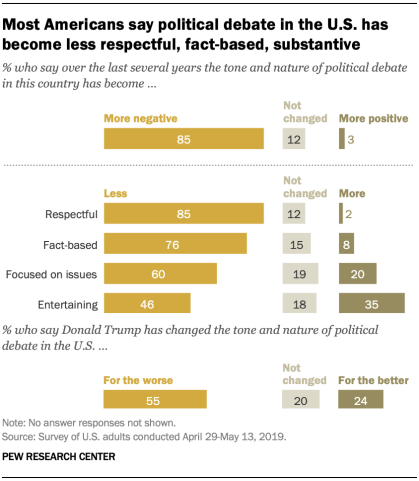 Large majorities say the tone and nature of political debate in the United States has become more negative in recent years – as well as less respectful, less fact-based and less substantive.
Large majorities say the tone and nature of political debate in the United States has become more negative in recent years – as well as less respectful, less fact-based and less substantive.
Meanwhile, people’s everyday conversations about politics and other sensitive topics are often tense and difficult. Half say talking about politics with people they disagree with politically is “stressful and frustrating.”
When speaking with people they do not know well, more say they would be very comfortable talking about the weather and sports – and even religion – than politics. And it is people who are most comfortable with interpersonal conflict, including arguing with other people, who also are most likely to talk about politics frequently and to be politically engaged.
Donald Trump is a major factor in people’s views about the state of the nation’s political discourse. A 55% majority says Trump has changed the tone and nature of political debate in this country for the worse; fewer than half as many (24%) say he has changed it for the better, while 20% say he has had little impact.
Perhaps more striking are the public’s feelings about the things Trump says: sizable majorities say Trump’s comments often or sometimes make them feel concerned (76%), confused (70%), embarrassed (69%) and exhausted (67%). By contrast, fewer have positive reactions to Trump’s rhetoric, though 54% say they at least sometimes feel entertained by what he says.
Pew Research Center’s wide-ranging survey of attitudes about political speech and discourse in the U.S. was conducted April 29-May 13 among 10,170 adults. Among the other major findings:
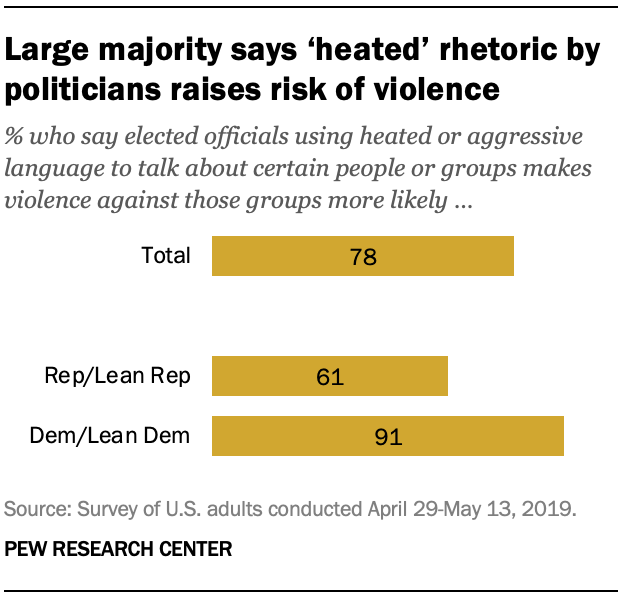 Broad agreement on the dangers of “heated or aggressive” rhetoric by political leaders. A substantial majority (78%) says “heated or aggressive” language directed by elected officials against certain people or groups makes violence against them more likely. This view is more widely shared among Democrats and Democratic-leaning independents than Republican and Republican leaners.
Broad agreement on the dangers of “heated or aggressive” rhetoric by political leaders. A substantial majority (78%) says “heated or aggressive” language directed by elected officials against certain people or groups makes violence against them more likely. This view is more widely shared among Democrats and Democratic-leaning independents than Republican and Republican leaners.
Partisans demand a higher standard of conduct from the other party than from their own. Majorities in both parties say it is very important that elected officials treat their opponents with respect. But while most Democrats (78%) say it is very important for Republican elected officials to treat Democratic officials with respect, only about half (47%) say it is very important for officials from their party to treat Republican politicians with respect. There is similar divide in the opinions of Republicans; 75% say Democrats should be respectful of GOP officials, while only 49% say the same about Republicans’ treatment of Democratic officials.
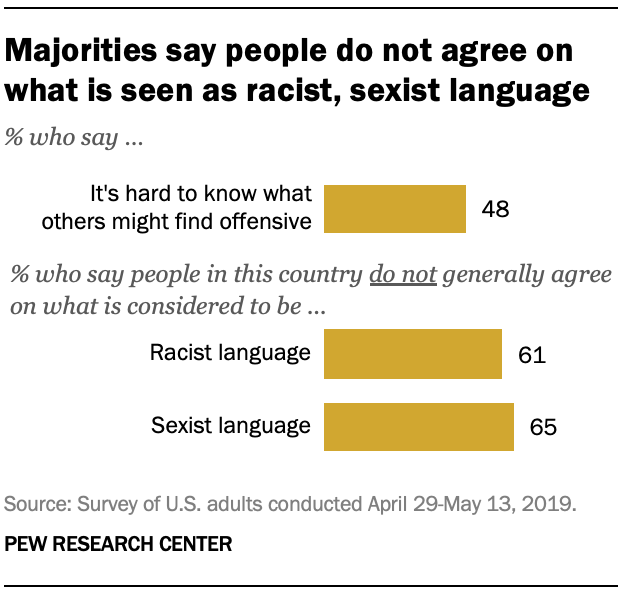 Uncertainty about what constitutes “offensive” speech. As in the past, a majority of Americans (60%) say “too many people are easily offended over the language that others use.” Yet there is uncertainty about what constitutes offensive speech: About half (51%) say it is easy to know what others might find offensive, while nearly as many (48%) say it is hard to know. In addition, majorities say that people in this country do not generally agree about the types of language considered to be sexist (65%) and racist (61%).
Uncertainty about what constitutes “offensive” speech. As in the past, a majority of Americans (60%) say “too many people are easily offended over the language that others use.” Yet there is uncertainty about what constitutes offensive speech: About half (51%) say it is easy to know what others might find offensive, while nearly as many (48%) say it is hard to know. In addition, majorities say that people in this country do not generally agree about the types of language considered to be sexist (65%) and racist (61%).
Majority says social media companies have responsibility to remove “offensive” content. By a wide margin (66% to 32%), more people say social media companies have a responsibility to remove offensive content from their platforms than say they do not have this responsibility. But just 31% have a great deal or fair amount of confidence in these companies to determine what offensive content should be removed. And as noted, many Americans acknowledge it is difficult to know what others may find offensive.
Talking about Trump with people who feel differently about him. The survey asks people to imagine attending a social gathering with people who have different viewpoints from theirs about the president. Nearly six-in-ten (57%) of those who approve of Trump’s job performance say they would share their views about Trump when talking with a group of people who do not like him. But fewer (43%) of those who disapprove of Trump say they would share their views when speaking with a group of Trump supporters.
What’s OK – and off-limits – for political debates
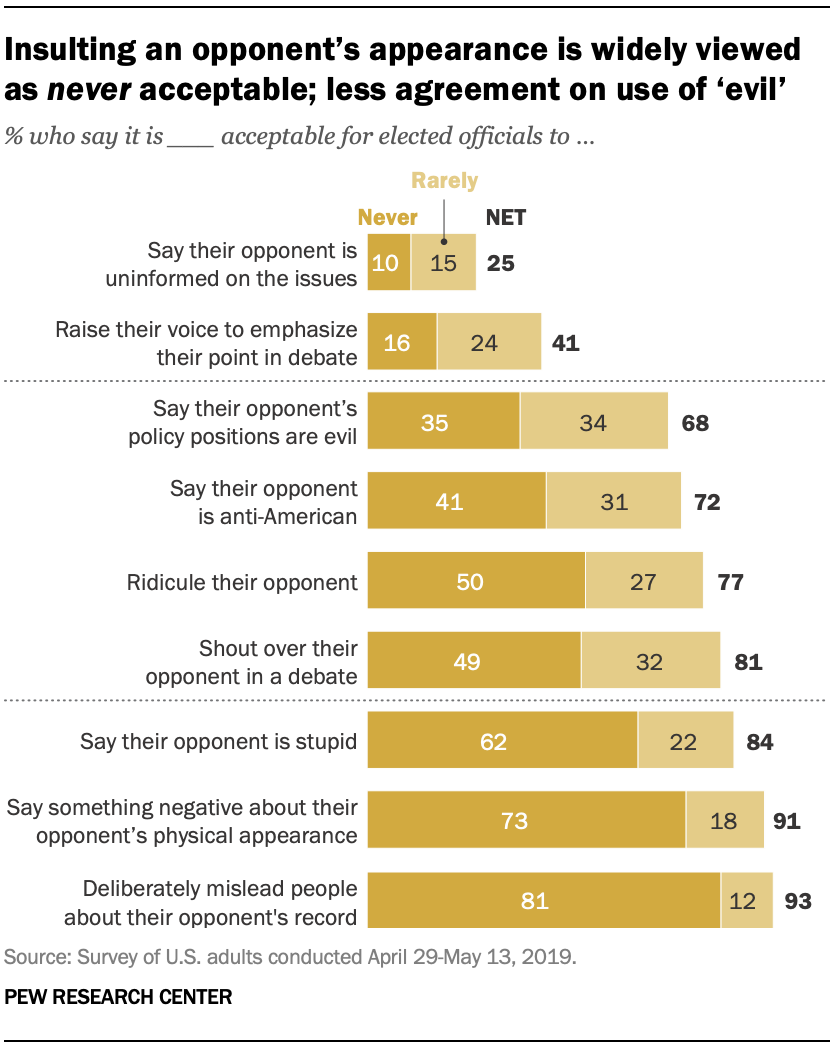 While Americans decry the tone of today’s political debates, they differ over the kinds of speech that are acceptable – and off-limits – for elected officials to use when criticizing their rivals.
While Americans decry the tone of today’s political debates, they differ over the kinds of speech that are acceptable – and off-limits – for elected officials to use when criticizing their rivals.
Some language and tactics are viewed as clearly over the line: A sizable majority (81%) says it is never acceptable for a politician to deliberately mislead people about their opponent’s record. There is much less agreement about the acceptability of elected officials using insults like “evil” or “anti-American.”
Partisanship has a major impact on these opinions. For the most part, Democrats are more likely than Republicans to say many of the insults and taunts are never acceptable. For example, 53% of Democrats say it is never acceptable for an elected official to say their opponent is anti-American; only about half as many Republicans (25%) say the same.
As with views of whether elected officials should “respect” their opponents, partisans hold the opposing side to a higher standard than their own side in views of acceptable discourse for political debates.
Most Republicans (72%) say it is never acceptable for a Democratic official to call a Republican opponent “stupid,” while far fewer (49%) say it is unacceptable for a Republican to use this slur against a Democrat. Among Democrats, 76% would rule out a Republican calling a Democratic opponent “stupid,” while 60% say the same about Democrat calling a Republican “stupid.” See Chapter 2 for an interactive illustration of how people’s views about the acceptability of political insults vary depending on whether or not they share the same party affiliation of the elected officials casting the insults.
Large shares have negative reactions to what Trump says
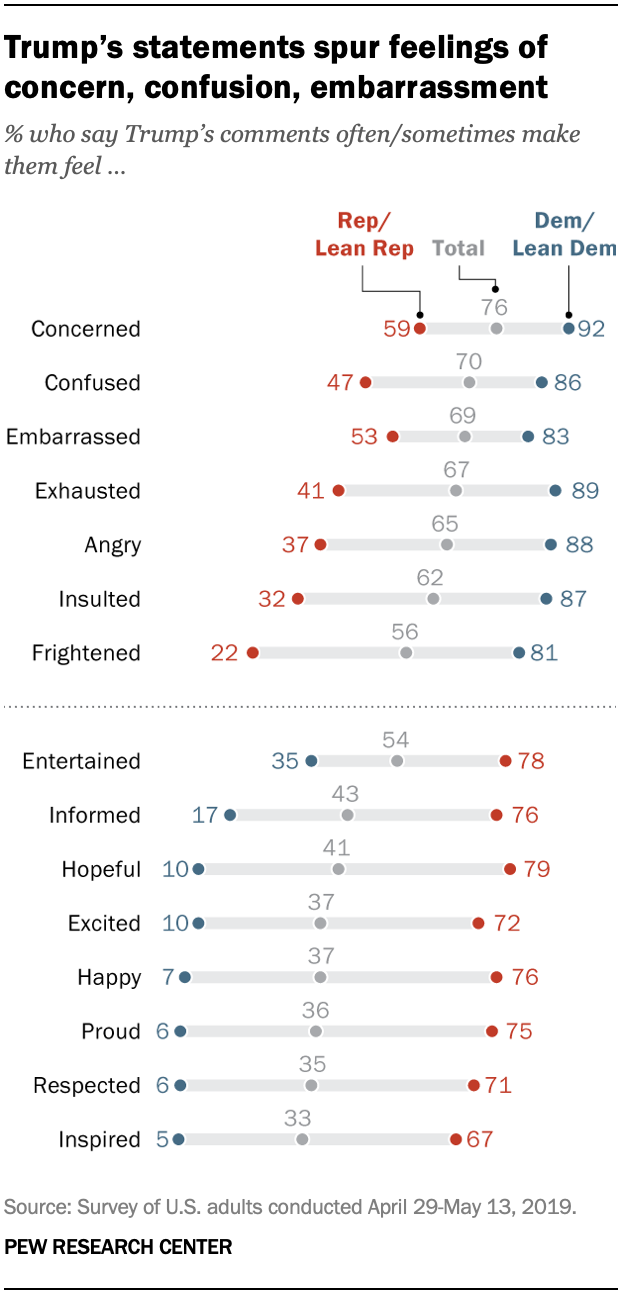 Majorities of Americans say they often or sometimes feel a range of negative sentiments – including concern, confusion, embarrassment and exhaustion – about the things that Trump says.
Majorities of Americans say they often or sometimes feel a range of negative sentiments – including concern, confusion, embarrassment and exhaustion – about the things that Trump says.
Positive feelings about Trump’s comments are less widespread. Fewer than half say they often or sometimes feel informed, hopeful, excited and happy about what the president says. A 54% majority says they at least sometimes feel entertained by what Trump says, the highest percentage expressing a positive sentiment.
Democrats overwhelmingly have negative reactions to Trump’s statements, while the reactions of Republicans are more varied. Among Democrats and Democratic-leaning independents, at least 80% say they often or sometimes experience each of the seven negative emotions included in the survey.
A 59% majority of Republicans and Republican leaners say they often or sometimes feel concerned by what Trump says. About half also say they are at least sometimes embarrassed (53%) and confused (47%) by Trump’s statements.
By contrast, large majorities of Republicans say they often or sometimes feel hopeful (79%), entertained (78%), informed and happy (76%) and other positive sentiments in response to the things Trump says.
No more than about 10% of Democrats express any positive feelings toward what Trump says, with two exceptions: 17% say they are often or sometimes informed, while 35% are at least sometimes entertained.
Republicans see a less ‘comfortable’ environment for GOP views
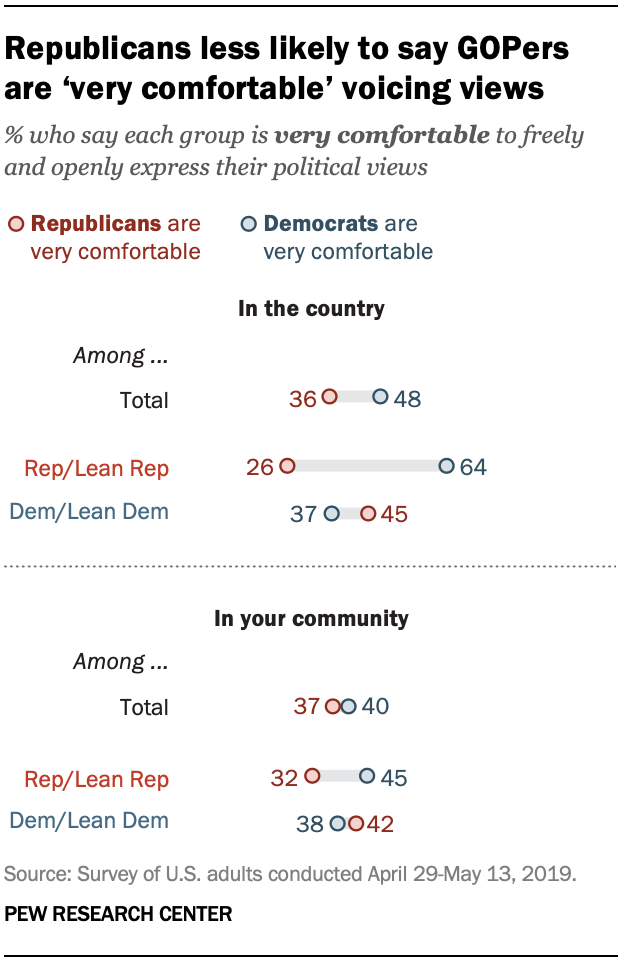 Republicans say that members of their party across the country are less comfortable than Democrats to “freely and openly” express their political views. In addition, Republicans are far more critical than Democrats about the climate for free expression in the nation’s educational institutions – not just colleges, but also community colleges and K-12 public schools.
Republicans say that members of their party across the country are less comfortable than Democrats to “freely and openly” express their political views. In addition, Republicans are far more critical than Democrats about the climate for free expression in the nation’s educational institutions – not just colleges, but also community colleges and K-12 public schools.
Just 26% of Republicans say that Republicans across the country are very comfortable in freely and openly expressing their political opinions; nearly two-thirds of Republicans (64%) think Democrats are very comfortable voicing their opinions. Among Democrats, there are more modest differences in perceptions of the extent to which partisans are comfortable freely expressing their political views.
There are smaller partisan differences when it comes to opinions about how comfortable Republicans and Democrats are expressing their views in their local communities. Yet these opinions vary depending on the partisan composition of the local community. Republicans and Democrats living in counties that Trump won by wide margins in 2016 are more likely than those in evenly divided counties (or those that Hillary Clinton won decisively) to say Republicans are very comfortable expressing their views.
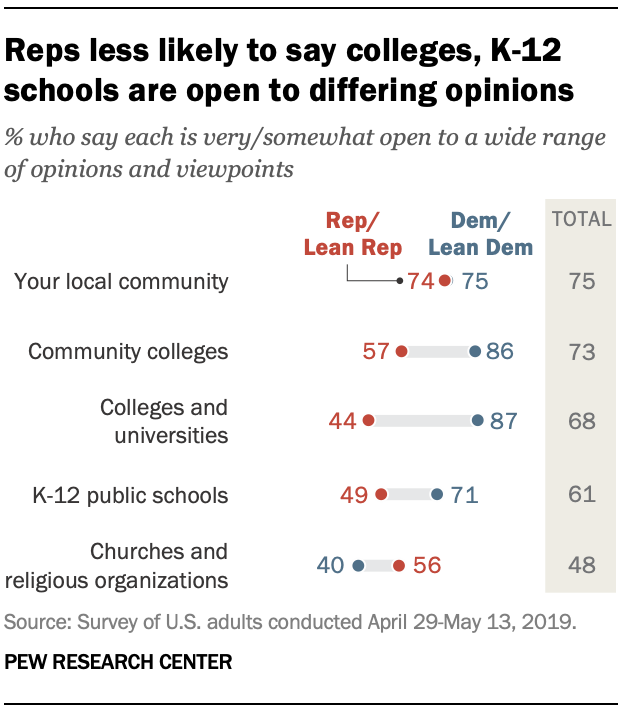 Republicans’ concerns about the climate for free speech on college campuses are not new. The new survey finds that fewer than half of Republicans (44%) say colleges and universities are open to a wide range of opinions and viewpoints; Democrats are nearly twice as likely (87%) to say the same.
Republicans’ concerns about the climate for free speech on college campuses are not new. The new survey finds that fewer than half of Republicans (44%) say colleges and universities are open to a wide range of opinions and viewpoints; Democrats are nearly twice as likely (87%) to say the same.
Republicans also are less likely than Democrats to say community colleges and K-12 public schools are open to differing viewpoints. By contrast, a larger share of Republicans (56%) than Democrats (40%) say that churches and religious organizations are very or somewhat open to a wide range of opinions and viewpoints.
Members of both parties generally view their own local communities as places that are open to a wide range of viewpoints. Large and nearly identical shares in both parties say their local community is at least somewhat open to a wide range of opinions and viewpoints (75% of Democrats, 74% of Republicans).


 Views about the acceptability of political insults
Views about the acceptability of political insults Across the Table: Would you share your views of Trump over dinner?
Across the Table: Would you share your views of Trump over dinner?